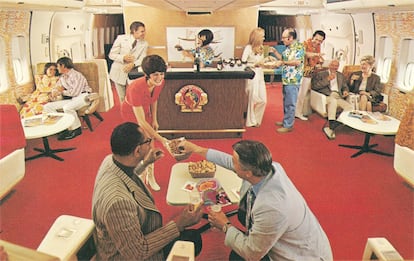Wasting time, living free of social media, having kids and knowing the hidden spots: The true luxuries of the super-rich in 2025
The much-heralded phenomenon of ‘quiet luxury’ is evolving, with experts saying that today’s true indulgences are peace, quiet and freedom to form biological or chosen families


According to Emma Burleigh in her incisive article for Fortune, between 1984 and 2024 the West had an infallible barometer of opulence, status, and taste: the Hermès Birkin. Anyone seen toting one of the coveted bags in public was putting out a very specific message: they’d paid at least $25,000 and navigated a waiting list that frequently lasted two and a half years.
The most exclusive variations of the model, like the Birkin Faubourg and the diamond-studded crocodile skin, were auctioned off at Sotheby’s for prices that neared a half-million dollars, situating their eventual owners in that small elite of sumptuous aristocrats with good taste that included Jennifer Lopez, Rachel Roy, Victoria Beckham, Lady Gaga and the sultana of Brunei. There was even a decadent bracelet model designed by Pierre Hardy (of which only three were made, each featuring more than 2,000 diamonds) that sold for close to $2 million.
Everything changed in December 2024, when Walmart began to sell virtually identical copies of the famous bag for less than $100. The imitations, dubbed Wirkins, have become common sightings. Few care that that the replicas are manufactured by such unglamorous brands as KAMUGO and Aidrani. They look the part, and young influencers post their euphoria over receiving their ostentatious, very much ungenuine Wirkins at home (they could only be bought online.) The pirated bags have become a trend on social networks like TikTok.
The luxury that can’t be bought
Sporting a fake Birkin has begun to be seen as a display of ironic ostentatiousness, a knowing wink, a vote in favor of the democratization of luxury. Keep your half-million-dollar handbag — mine is identical, cost me a thousandth of the price and nobody cares that it’s fake, after all. Alice Sherwood, author of the book Authenticity: Reclaiming Reality in a Counterfeit Culture, told Wired that more and more consumers (including those with considerable acquisitive power) have moved past the shame of buying pirated products. Put simply, “People no longer want to spend upwards of £4000 on the latest ‘It’ bag that might be out of vogue within a year,” and cheap alternatives no longer carry an aura of ridiculousness and disrepute.
Burleigh concludes that the paradoxical banalization of luxury is arriving at unexpected extremes. Nowadays, almost nothing that can be bought with money is automatically perceived as an indicator of status. Not Peter Moore-designed Chicago Bulls Air Jordans, nor Prada bags nor Jimmy Choo heels. Neither are weight loss cures, which have been knocked from their pedestal by the rise of cheap drugs like Ozempic, nor expensive cosmetics, whose beautifying effects are only marginally superior to those of makeup products suitable for all budgets.
In Burleigh’s opinion, all this adds up to bad news “for Dior, Versace and Burberry.” Even the super-rich, the 1% of the population that controls, according to Oxfam, 95% of global wealth, are turning to post-luxury, post-opulence culture. That is to say, the not-entirely-intuitive idea that what separates the true elite from common mortals has more to do with preferences and lifestyles than consumption patterns. In the words of Dana Thomas, the true luxuries are “taking a nap, calmness and happiness.”
The indulgences of the new elite
Skeptics would argue that this is nothing new. Even going back to the verses of Horace, a first-century BC Roman writer, one finds an eloquent ode to the simple life imagined as a privilege of the true elite, those who are never forced to take up the sword and who do not fear the wrath of the sea. Let’s say that the idea has long lingered on the periphery of the collective imagination and occasionally, such as in our current moment, makes its way into the spotlight.
Eugene Healey, content creator, brand strategist and (self-designated) cultural critic, believes that the ultra-rich of the first third of the 21st century are spending their money in a “more intelligent and creative” way than ever, because instead of perishable objects, they’re opting for “long-term values” like “privacy, leisure time, enriching and meaningful experiences, novelties and forms of personal expression.” And they’re not doing it because they have more money than the rest, but because they have access to privileged information and know what true value is.
Healey has built out this controversial thesis via a series of videos on Instagram and TikTok that position themselves as the contemporary equivalent of the kind of stoicism for elites pushed by Lucio Seneca nearly 2,000 years ago. Healey acknowledges that the framework for the new post-luxury opulence was built long ago, but that trends will take things even further in coming years.
The supreme luxury, argues Healy, is “being chronically offline.” This functions on various levels. Firstly, it allows one to disconnect from the parallel online identity that has vampirized and supplanted our real persona. For Healey, “What we’ve witnessed in the last 10 years is the gradual degradation of the internet from our great white hope for society to the thing that just might doom us all. Everywhere we look, our online spaces have become increasingly hostile and now we treat the internet as something that we have to be on, because it keeps us connected to our friends, helps us advance our careers, and makes sure we are consuming products that society deems are cool.”
As a consequence, large internet service providers have turned us into products, harvesting our personal data with total impunity and profiting from it, creating, at our expense, the new information economy. He offers as an example Apple’s pivot to marketing the iPhone as the smartphone that offers privacy, a much greater luxury than megapixels or a superior zoom, and which puts Apple in a position similar to that of a luxury brand. “Luxury is built out of the statement that you are safe, you won’t be tracked, you won’t be harvested — you are not the product.” In this culture of universal exposure, “the greatest privilege is to be invisible” and at the same time, see everything. That is to say, keep oneself offline as much as possible, safe from algorithms and free of the need for an active presence on social media, without losing the benefits of staying connected (“can you still know the cool places to eat, the right places to shop, the right brands to wear?”) In fact, restaurants and hotels with scarce online presences are becoming hot commodities, exclusive to those looking for a truly different and discreet experience and who are not prone to revealing their secrets to the masses.
In other words, the recipe for selective disconnection consists of maintaining oneself connected to “genuine influence” through truly select channels of communication (“niche subcultures”) in which the elite can “feel safe.” Here, Healy talks in a more theoretic than practical sense about an alternative network to the internet as we know it that would be distanced from the noise and toxicity that the web currently possesses, and which would be run by people who are its active participants. This can be brought down to Earth with a practical and doable example: not having social media, but belonging to closed groups on Telegram or WhatApp in which people in the know from different sectors share things they enjoy, places and trends. The old-school monopoly on qualitative information, now channeled through technology.
Other luxuries? Being able to “waste time.” According to Healey, we are at the dawn of an increasingly refined “new leisure class” (as opposed to saying “the idle rich”), who can dispense with the frantic optimization of time in which the rest of us earthlings are immersed. This new emerging class is defined “not by what they do, but how effortlessly they exist.” Healey isn’t necessarily talking about people whose income comes from collecting rent, but rather, for example, the informational geniuses with disruptive skills who can easily earn their living by working a few hours a week and spending the rest of their time letting life flow, being “present and enough as they are.”
It’s also become a luxury and indicator of status to be able to have children (and dedicate time to their upbringing and to enjoy emotionally significant experiences with them), creating communities of like-minded people and cultivating a personal bubble of interests and passions. In a certain sense, Healey is postulating a redefinition of luxury in post-material terms that includes the right to intimacy, a relaxed lifestyle, emotional plenty, access to information, highly specialized and rich networks of social interaction and the chance to development one’s personal enrichment in a way that goes far beyond professional career. As affirmed by a comment on one of these videos, it’s the contemporary version of the Renaissance man.
To what point do the current ultra-rich fit into this new ideal? In the opinion of analysts like Justin Klawans, the contemporary billionaire par excellence Elon Musk fits better into the definition offered by the cynical Oscar Wilde of an individual who knows “the price of everything and the value of nothing.” Burleigh insists, against all proof, that the ultra-rich of our time aren’t as obsessed as they were 10 or 20 years ago with showing off their incommensurate acquisitive powers. Now, she says, they aspire to monopolize “the good life,” leaving the rest of us to a world stripped of intimacy, of permanent stress, of stripped-down leisure, unhealthy habits — and lacking children. However, we do have the meager consolation of being able to buy a $100 Birkin that can barely be told apart from the real thing.
Sign up for our weekly newsletter to get more English-language news coverage from EL PAÍS USA Edition
Tu suscripción se está usando en otro dispositivo
¿Quieres añadir otro usuario a tu suscripción?
Si continúas leyendo en este dispositivo, no se podrá leer en el otro.
FlechaTu suscripción se está usando en otro dispositivo y solo puedes acceder a EL PAÍS desde un dispositivo a la vez.
Si quieres compartir tu cuenta, cambia tu suscripción a la modalidad Premium, así podrás añadir otro usuario. Cada uno accederá con su propia cuenta de email, lo que os permitirá personalizar vuestra experiencia en EL PAÍS.
¿Tienes una suscripción de empresa? Accede aquí para contratar más cuentas.
En el caso de no saber quién está usando tu cuenta, te recomendamos cambiar tu contraseña aquí.
Si decides continuar compartiendo tu cuenta, este mensaje se mostrará en tu dispositivo y en el de la otra persona que está usando tu cuenta de forma indefinida, afectando a tu experiencia de lectura. Puedes consultar aquí los términos y condiciones de la suscripción digital.








































